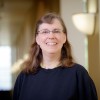This article is more than 5 years old.
It’s been clear for some time now that the Music Library Association has outgrown the traditional members-take-turns-hosting-the-annual-meeting system; so this year, for the first time, we engaged an event-planning firm, who seems to have taken their cue from ALA, because we fetched up in Orlando. Besides the balmy temps, there was a second good reason for Orlando: this year, again for the first time, we invited Latin American colleagues to join us in a Pan-American conference. (As usual, we had presenters from Canada too – MLA’s membership encompasses North America). Our Latin American presenters came from Mexico, Puerto Rico, Cuba, Brazil, Chile, and Uruguay, and addressed topics relating to cataloging, access, digital humanities, reference, musicology, and performing-arts librarianship. U.S. colleagues presented on their institutions’ Latin American music collections.
A couple of take-aways from the Latin American contingent:
Mexico’s CENIDIM, a consortium of research centers, is planning an initiative similar to our own Amanda Foster’s award-winning LIB100 project: Wikipedia articles on Mexican women composers.
Many U.S. universities have Latin American holdings that far exceed what is actually available to Latin American researchers in their home countries. This, one presenter argued, places an obligation on U.S. institutions to make access easier for Latin American students and scholars.
INSTRUCTION
A colleague from U of Oregon gave an entertaining presentation on a new active-learning idea she had for one-shot BI sessions in freshman seminars: a research “race.” Teams of students compete to be the first to complete five “legs” of the race: navigating library spaces and services; finding an encyclopedia, looking up a specified article, and answering a list of questions; selecting a book from the encyclopedia’s bibliography, searching it in the library catalog, and if it’s not held, identifying an ILL source; finding a journal article in a database (a LibGuide lists relevant ones, and gives search tips), and answering another list of questions; and using the “Chat” button to report to the instructor when they are finished. Prizes: library swag (which the students thought was way cool). Professors were also happy: they remarked that they had never seen students so engaged in a library-research session before. And it fulfilled an important objective: students continued to return to librarians for help throughout the semester. Challenges include: time consumed in navigation logistics; often no time for a final wrap-up; and it requires a lot of preparation (including notifying/recruiting other library staff re navigation assistance, class traffic on Chat, etc.). Our presenter also found that lecture was really the most effective method for imparting some basic knowledge of call numbers, the catalog record, and interpreting search results, before starting the race.
COPYRIGHT
This year’s copyright session focused on institutional recordings – student and faculty performances locally recorded by the school. A couple of special wrinkles with these:
- The intersection of copyright and FRPA.
- The question of ownership: the institution may be viewed as a joint author or co-owner, or as a producer. Some states define the owner as the entity authorizing the making of the recording – this could be the institution as well as the performer.
LINKED DATA PROJECTS
A plenary session introduced the concept of “mix-and-match ontologies”: given that linked data will be a mixed environment, the best solution is a “fusion” of ontologies. Cross-walking MARC data to multiple ontologies will be the critical next step for the near future.
UC Davis’ Bibflow project (which has been developing workflows related to the still-in-development encoding schema Bibframe) is working on a “thin MARC” – an interim solution until full conversion from MARC (the current encoding format) to Bibframe is achievable. This would allow libraries to incrementally adopt LD (beginning, say, with books, and then tackling other types of materials). Crowdsourced upgrading of authority records is another thing they’re exploring.
LD4L (the library consortium devoted to LD development) has launched a new project called “LD for Performed Music.” This aims to produce a refined Bibframe-based ontology for music-specific aspects such as opus number, key/mode (expanded to accommodate non-Western music), and performance events (a category that a number of projects have been toiling on for a while now).
And an exciting new project from France, called Doremus (“Doing Reusable Musical Data”). Three institutions – the Bibliotheque Nationale, Radio France, and the Philharmonie de Paris – are converting their databases to RDF triple store in order to exploit LD applications. In the process, they’re creating new categories and RDF properties (e.g., for genre) and a vocabulary for events. Their data will be open source, using SPARQL Endpoint. The Philharmonie is already reusing the data for its events calendar, social media (including a “recommender” tool), and its newsletter.
COMMITTEE WORK
I wish I could have attended more of the Latin American sessions, but this year, quite to my amazement, I landed memberships on two MLA committees – so now I can join a number of my ZSR colleagues in lamenting the curtailed session-attending opportunities due to committee duties. The latter have been interesting, at any rate. For one, I’ve now seen the “Best of Chapters” award process (nomination of regional chapter papers for presentation at the national meeting) from both sides: having served on the Southeast chapter’s BOC committee a few years ago, sending a paper up to the national committee, I now get to see all the outstanding new research coming out of the MLA chapters. For my other committee, Career Development Services, I served as a co-coordinator for their advisory service, which connects volunteer advisors with colleagues seeking advice on specific issues.

5 Comments on ‘Leslie at MLA 2017’
Congrats on the committee appointments!
It’s interesting to hear about all the LD work being done in this field. Enjoyed your whole report!
Leslie, thanks for sharing all of this good information!
Makes sense that music librarianship would span national borders – great learning opportunity!
Great write up, Leslie! The instruction race sounds like a lot of fun!